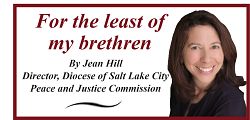Let's get to our Gospel mission
Friday, Jun. 03, 2016
Pope Francis has a way with words. More specifically, he has a way of synthesizing Church teaching into readily understandable actions for those of us without theology doctorates and years of seminary.
A recent example is his summary of our Gospel call at the World Humanitarian Summit: “There must be no family without a home, no refugee without a welcome, no person without dignity, no young man or woman without a future, no elderly person without a dignified old age.”
There it is. The world we committed to help build in our Baptism.
Clearly, nothing on Pope Francis’ list is easily accomplished. However, each item is utterly possible to achieve in the very long term, if we are willing to take personal steps within our communities, and engage in actions that have global impacts.
Consider, as just one possibility, the call to ensure “no refugee is without a welcome.” This message has been heard loud and clear in Utah. Through Catholic Community Services, we provide assistance to incoming refugees to help with their transition from one country to another. Catholic volunteers within parishes have often been the first face of these efforts, greeting newly arriving, often traumatized individuals at the airport and helping walk them through the strange wonderland that is an American state. These volunteers make the personal effort to not only welcome refugees, but to get to know the families as people, recognizing their dignity and helping ensure their future success.
On the global level, our Church aids refugees around the globe through Catholic Relief Services and Caritas Internationalis. In fact, through CRS and Caritas we try to help people avoid becoming refugees in the first place. This is not always possible, especially in war-torn countries. But CRS has a long history of peacebuilding as well as providing culturally appropriate development assistance so that individuals and families are able to sustain themselves in a manner that respects their human dignity and provides meaningful opportunities to work and protect themselves within their home countries.
Catholics in the pews support these efforts through contributions to CRS, of course, but also through advocacy, not only within the halls of state and federal legislative branches, but with friends and neighbors. Any time we are able to get another person to move from thinking “they don’t belong here” to asking in an authentic way “Why have they come here?” we have been good advocates for Catholic social justice. Not that everyone will engage in a serious examination of the factors that lead both refugees and immigrants to flee their homes, but if even a few do, the impact ripples out widely.
Asking the why question may even help us challenge ourselves to question our own assumptions about people. It could also enable us to overcome more of the barriers Pope Francis reminds us we agreed to address as baptized Catholics.
Imagine, for instance, a homeless person who seems to have no desire to live any other lifestyle. There aren’t many people who want to be homeless, but there are some. How do we treat this person? How do our assumptions about this person’s attitude affect our attitude toward the broader homeless population? If a person truly chooses to be homeless, are they any less worthy of being treated as human beings? No, according to Catholic doctrine. So how do we serve someone who does not want to meet our expectations? If we understand the Gospel call, we still provide basic needs, we still address them as human beings, and we ask why questions, not to pass judgment, but to understand our fellow men and women and serve them better.
Pope Francis succinctly laid out our Gospel mission. Let’s get to it.
For questions, comments or to report inaccuracies on the website, please CLICK HERE.
© Copyright 2024 The Diocese of Salt Lake City. All rights reserved.
© Copyright 2024 The Diocese of Salt Lake City. All rights reserved.


Stay Connected With Us